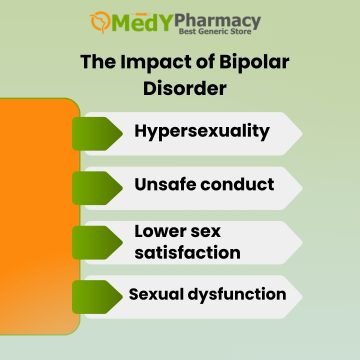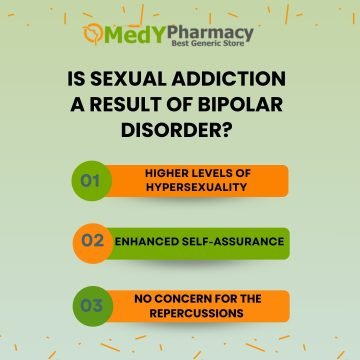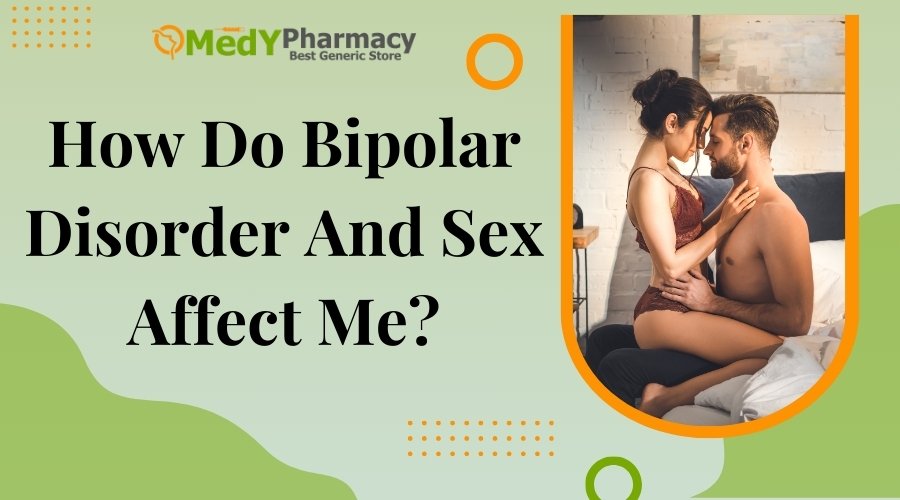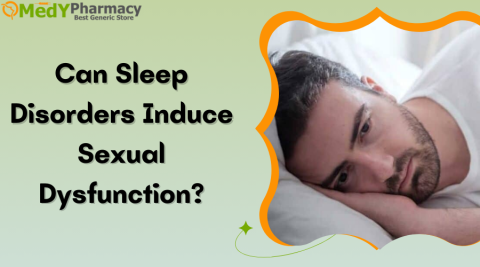Introduction:
You are not alone if you experience changes in your sexual health when you have bipolar disorder. Your sexual experience and conduct can be changed by your disease and some of the drugs used to treat it.
Working with your doctor to identify strategies to enhance your sexual health will be made possible by your ability to recognise important symptoms and adverse effects.
Extreme mood fluctuations, from feeling happy, vivacious, and dangerous to feeling depressed and uninterested, are symptoms of bipolar disorder. Known as manic and depressive episodes, these mood swings are the hallmarks of bipolar illness.
Significantly elevated libido drive and impulsive, careless sexual practices are prevalent during manic episodes in people with bipolar disorder. Such sexual activity frequently indicates a manic episode.
What Is Bipolar Disorder?
This particular kind of mood disorder affects a person’s energy, mood, and communication. It can be difficult for people to express their demands and problems effectively. Their conversation and demeanor toward you may exhibit extreme mood swings and hostility.
Being aware of your own needs is crucial since managing the highs and lows of someone with bipolar disorder may be extremely challenging. Since some people may not be aware of the differences between bipolar I and II, it’s crucial to establish clear guidelines for communication and take into account whether they have been diagnosed with bipolar disorder.
This uncontrollable sexual behaviour may also be an indication of a mental health issue, like bipolar disorder, for certain individuals. This is a good condition in which individuals suffer manic and depressed mood swings.
Addiction to cocaine, methamphetamine, and sex can also occur in the setting of developmental trauma, which can lead to attachment issues.
People who exhibit hypersexuality or uncontrollable sexual behaviour should therefore always have a comprehensive differential diagnosis. A patient’s medical history and tests are used in this kind of examination to help differentiate between potential diseases and conditions.
What Is Hypersexuality?
Extreme attention to sex, sexual ideas, or sexual behaviour is known as hypersexuality. Extreme fantasies that appear out of control, compulsive thoughts about sex, and sexual risk-taking despite negative consequences are all signs of hypersexuality.
This can cause distress and have a detrimental effect on relationships and other aspects of life, including jobs and education.
Nowadays, a strong and frequent desire to have sex, masturbate, or watch pornography might be a sign of hypersexuality. Since the emphasis is on sating the urge rather than potential repercussions, some people characterize their experiences as being addicted to or obsessed with sex. This makes the individual more prone to dangerous activities like watching porn at work or having unprotected sex with a stranger.
A person may have severe feelings of shame or remorse after acting on desires linked to bipolar hypersexuality. This can be because the cravings are frequent or because you can’t control them. Furthermore, it might be the result of regret for improper actions. In the future, they might look for methods to regulate themselves since they don’t want to keep feeling and acting on the cravings.
Manic Episodes and Sexuality
Your sex drive and sexual desires can frequently cause you to engage in sexual activity that is out of character for you outside of manic episodes.
- Significantly more sexual activity without a sense of sexual fulfillment
- Having sex with several people, including complete strangers
- Excessive masturbation
- Ongoing sex, even though it could jeopardize relationships
- Sexual conduct that raises the risk of doing something that could have unfavorable consequences, such as getting an STI
- Obsession with sexual ideas
- Growing usage of pornography
Being hypersexual can be a difficult condition for people with bipolar disorder.
More research is required to examine the condition’s prevalence.
This patient receiving outpatient care in a private practice
- Individuals receiving outpatient treatment who did not suffer from schizophrenia or affective disorders
- Additionally, the authors emphasized the existing information on hypersexual individuals with bipolar disease at the outset of the study.
According to research, between 25 and 80 percent of individuals who have manic episodes also exhibit bipolar hypersexuality.
Furthermore, women are more likely than men to develop the illness.
It can be difficult for some adults with bipolar disorder to control their sexual cravings.
One of the symptoms of bipolar disorder in teens and young children is improper sexual conduct toward adults. This can involve excessive use of sexual language, unwanted touching, and inappropriate flirtation.
Depression and sexuality
The reverse of hypersexuality might occur while you are having a depressive episode. This includes hyposexuality, which is characterised by decreased sexual urges. Depression frequently results in a lack of desire for sexual activity.
Frequently causes challenges in relationships because your spouse cannot fully comprehend your problems with your sex drive.
This is particularly valid if you exhibit hypersexual activity during high mania and then abruptly experience sadness and lose interest in having sex anymore. Your significant other can feel bewildered, irritated, or abandoned.
Sexual dysfunction is another effect of sadness. Men with ED and women with severe levels of sexual anguish are examples of this.
Sexual distress can also lead to mania or depression; in women with mood disorders, it can also affect quality of life.
Bipolar disorder and sex: links
Mania and depression are the two different moods that might define bipolar illness. An individual’s sexuality and personality may be significantly altered by episodes of each.
Little study has been done on the relationship between bipolar disorder and sexual activity.
Sexual distress and unhappiness are highly prevalent among female participants with the disease, according to this report.
Erectile dysfunction symptoms may be more common in men with bipolar disorder than in those without the disorder, according to the Journal of Sexual Medicine.
This just indicates that there is a higher prevalence within this group, not that all individuals with this experience sexual symptoms.
Depending on other symptoms of the disease, the sexual symptoms usually fluctuate.
The Impact of Bipolar Disorder
Extreme mood fluctuations are the hallmark of this mental condition. However, changes in sexual attitudes and risk-taking are also frequently associated with bipolar disease.

- Hypersexuality
Additionally, it is known as compulsive sexual conduct. That’s when having sex takes over your life. Even if it causes harm to you or others, you might not be able to control it. This typically occurs when you are in the manic or hypomanic stages of your disease. That’s when you’re most inclined to act in a way that makes you happy without considering the consequences.
- Unsafe conduct
People with bipolar disorder are not the only ones who have risky sexual behavior. However, the condition may make you more likely to take risks. These dangers may include having sex with drug users, having intercourse with strangers, or having sex without condoms or other forms of protection.
- Lower sex satisfaction
You can discover that you no longer find sex enjoyable. Alternatively, when you are in the depressive stage of your condition, your sex desire may decrease, leaving you feeling exhausted or uninterested.
- Sexual dysfunction
During sex, you may experience issues with desire, arousal, orgasm, and pain. This usually occurs when you’re not feeling manic or depressed and are in a “normal” mood. It might be a persistent sign of bipolar disorder.
An Increased Interest in Sex and Bipolar Disorder
Although there is no precise definition or set of standards for being hypersexual, it is generally understood to suggest that a person with bipolar disease is more preoccupied with sex and dangerous sexual practices than they typically are. What matters is the alteration or departure from typical conduct.
- Have several sexual partners.
- Engage in indecent flirtation
- Always consider having sex.
- Participate in one-night stands
- Have a strong interest in pornography
- Observe how their sexual behaviors have changed.
- Take part in other risky activities, such as gambling or excessive speeding.
Do Bipolar Disorder Symptoms Include Sexual Addiction?
Sexual addiction is when you think about and act sexually so frequently that it affects your relationships, health, career, and other areas of your life. This is occasionally used interchangeably with it.
One of the criteria for diagnosing bipolar disorder is hypersexuality. This is a typical symptom of bipolar disorder in persons.
Although the current Diagnostic and Statistical Manual of Mental Disorders does not mention sexual addiction as an illness, some individuals with bipolar disorder who experience increased sexuality may be diagnosed with it. No official diagnosis will be made for others.
Sexual Behavior and Mental Health in Bipolar Disorder
Depending on the phase, sex drive and satisfaction can vary in bipolar disorder (BD). For instance, during a manic episode, sex urge and satisfaction could differ significantly from those during a depressive phase.
The combination of hypersexuality and other bipolar manic symptoms, like impulsivity and poor judgment, can result in dangerous conduct.
Why hypersexuality occurs in some bipolar disease sufferers but not in others is unknown to researchers.
Effects of Depression on Sexual Performance
Sex drive can be destroyed by depression. Even the medications used to treat depression can suppress libido and sexual function, so it’s not simply the mood condition that’s to blame.
There are times when people have little to no desire to have sex for months or even years. This makes it more challenging to pursue or maintain a relationship. Feelings of inadequacy and self-blame are fueled by depression, which in turn affects how one feels about sex in general.
- Lack of sleep
Even the act of pursuing sex can be emotionally and physically taxing when one is exhausted.
- Medication
This patient may experience a reduction in their sexual desire and/or erection or orgasm capabilities when using certain drugs.
- Negative cycle
An individual may experience more feelings of shame and self-doubt the less sex they have.
- Self-care
Such sentiments are frequently accompanied by poor grooming and cleanliness.
- Respect for oneself
A person with bipolar disorder will frequently feel unwelcome and physically unappealing. Intercourse can also be hampered by feelings of vulnerability, worthlessness, and inadequacy.
Bipolar Personalization
He only experiences the euphoric state that accompanies mania, not severe episodes of sadness.
He was diagnosed with bipolar disorder, even though, as we previously discussed, this doesn’t cleanly fall into any of the three categories.
It’s also critical to keep in mind that each person has a unique set of triggers for manic and depressive episodes. We cannot assume that simply because we or someone we know has bipolar disorder, it will all show up in the same way.
I received depressing reviews during my one-year evaluation meeting today. Affirmations are my love language and a certain method to make me go crazy. I just need to relax because my head is too large.
Although it may take some time after diagnosis to identify the precise triggers for your bipolar disorder, some commonalities are bad life events, seasonal changes, and negative drug and/or alcohol reactions.
Depending on the intensity, you may also begin to lose your sense of reality during the height of a manic episode. Sufferers may begin to try to confirm what is true.
Every episode he has is always accompanied by spirituality. I need to do more yoga and meditation.
The average person might not understand this logically, but it emphasizes how crucial it is to comprehend how experiences can appear on a personal level.
Drugs and sexuality
There can be connections between a person’s sexuality and their drugs.
To treat mood disorders like depression, for instance, doctors frequently prescribe SSRIs. Some bipolar illness sufferers may find them helpful, although many of these medications also reduce sexual desire.
Those who experience hyposexuality during a depressed episode may find this side effect especially problematic.
Anyone who thinks that taking medicine is influencing their desire to have sex should think about discussing other choices with a physician. Before speaking with a doctor, do not stop taking your prescriptions. This could make it more likely that a manic or depressed episode will occur.
The Things You Can Do
Speaking openly and honestly with your doctor or therapist about any symptoms or side effects you’re experiencing is one of the best things you can do to help them adjust your therapy.
Monitoring your bipolar disorder’s sexual symptoms could be beneficial so that you and your doctor can find answers. When you’re trying different medications to figure out the correct kind and dosage, this is very crucial. Don’t alter or stop taking your prescription without your doctor’s approval.
Signs of Bipolar Disorder
Even though people are more aware of what this is and how it impacts people’s lives, and because it is being covered more frequently in the media, including TV, movies, and mainstream media, there are still many common misconceptions and stereotypes about its symptoms that make it difficult to identify and define the illness in ourselves and our loved ones.
- Reduced Sleep Requirements
Many individuals imagine what it would be like to have endless energy and be able to stay up all night. However, insomnia is common in bipolar disorder sufferers, and it can have several negative consequences, such as drowsiness throughout the day and anger during manic episodes.
Discovered that sleep problems and disturbed sleep were predictors of bipolar disorder’s manic phase. If you have been unable to get more than four to five hours of sleep every night for a week or longer, you may be suffering from mania.
- Rapid-Fire Ideas and Accelerated Speech
When someone has bipolar disorder, their thoughts seem to be racing off the teleprompter screen in their head too quickly to read, leading to jumbled thinking and jumbled words that are incomprehensible to the other person. However, you speak at such a rapid pace that it becomes difficult to follow what you are saying. It is yet unknown what specifically triggers bipolar individuals to have racing thoughts: Because of this, finding order in your day is crucial when dealing with this illness.
- Anxiety and Agitation
Imagine a person who sits at a restaurant for just two minutes before feeling the desire to get up and move because of something. Too much noise from the next table. The waiter is moving too slowly. His chair is swaying too much. Being anxious about what would happen if you don’t act right away and feeling stressed out by sitting still are two signs of bipolar mania. Anxiety and bipolar disorder share a lot of similarities. Talking to a mental health professional about anxiety is crucial if you are concerned that you or a loved one may have bipolar disorder.
- Overconfidence
Individuals who feel that intellect is fixed and who think they are very brilliant are prone to overconfidence, which is by no means exclusive to bipolar disease. Manic episodes can eliminate feelings of insecurity and give you the impression that you have unique superpowers that will enable you to accomplish incredible feats. A manic episode of bipolar disease may be the cause of these thoughts of invincibility, even if you’re feeling great at the moment. Discuss these feelings with a psychiatrist or other mental health professional.
- Risky and Impulsive Conduct
The shopping spree, the adulterous affair, and the cross-country motorbike journey are all signs of mania that most people are aware of. Additionally, the study discovered that bipolar illness drugs effectively reduced risk-taking behavior. It’s important to remember that what one individual views as hazardous or impulsive may be entirely different from what another person does. Speaking with a mental health expert about symptoms of mania is worthwhile if you find yourself abruptly stepping outside of your comfort zone.
- Hopelessness
There is sorrow, grief, and sadness throughout life. They aren’t enjoyable, but they don’t make a person less capable. But there is no place for optimism—cracks of light that slink through the shadows—in hopelessness. A lack of personality and expressionless eyes are two signs of melancholy that friends and relatives can readily pick up on. Authorities warn that during the winter, people may have a rise in this feature of bipolar disorder. How can we fight the depression? It is an efficient mood enhancer.
- Retraction from Friends and Family
Withdrawal from familiar people, places, and objects and apathy towards once-enjoyed activities can be signs of bipolar disorders down the cycle. Activities that used to give them a feeling of meaning and purpose, like sports, art, or music, no longer inspire depressed people. They seek solitude and seclusion. This patient may dissociate, which is a condition in which they lose touch with their emotions regarding the outside world. If it sounds like you, discuss getting help with your doctor.
- Alteration in Appetite
Some people overindulge in junk food when they’re feeling down. Others pick at their meal, showing no desire to eat. Others lie awake all night, while others are unable to leave their beds. Ironically, all of these behaviours are also causes of bipolar disorder, even though they can all be symptoms of the disorder. A depressive cycle of bipolar disorder may be indicated if you are noticing notable changes in both your food and sleep patterns. Monitor both, and if they don’t control themselves in two weeks, think about seeking assistance.
- Suicidal Ideas
This is a startling statistic: Individuals with bipolar disorder have 20–30 times greater suicide rates than those without the disorder, even though this affects 1%–5% of the overall population. Furthermore, up to one in five individuals with bipolar disease commit suicide. In one study, 41% of bipolar 1 individuals reported self-harm of some kind. Obsessions about harming oneself or dying should never be ignored. A mental health expert can assist in managing bipolar disorder, which can be indicated by even hypothetical thoughts about how you might terminate your life. You should get help right away because this is not something you should handle alone.
Bipolar Disorder’s Impact on Sexuality
Both manic and depressed states are symptoms of bipolar illness.
A person may experience an increase in their desire for sex during manic episodes and end up having riskier sex, which can be detrimental to relationships. Many people experience feeling this way for days or weeks at a time; however, the length of time varies.
Sexual intimacy or sexual intercourse may seem completely uninteresting to someone who is depressed. In addition to causing other interpersonal problems, a lack of interest can exacerbate depressive symptoms. It might be difficult to recover from depression because the symptoms of the illness usually have a detrimental effect on relationships. You and your partner must have candid, nonjudgmental conversations about your objectives, aspirations, and difficulties.
Bipolar Sexuality and Manic Mania
A manic episode can significantly boost a person’s sexual urge. A considerable increase in sexual activity relative to non-manic states is indicative of hypersexuality during a manic episode. Additionally, sex addictions are more prevalent in people who already have mental health conditions, including OCD, bipolar disorder, anxiety, or despair.
- Multiple-partner sex
- Masturbation regularly
- Risky sexual practices
- Intercourse
- Continuous fantasies of having sex
- Being sexually active while crossing boundaries
How Bipolar Disorder Drugs Impact Sexuality
It is noteworthy that there is a correlation between sexual desire and regularly administered bipolar drugs. The experience of decreased sexual drive is one of the adverse effects of these drugs. This can have a detrimental sexual impact, managing some aspects of the illness while aggravating others. The idea that taking bipolar drugs may hurt sex drive, orgasm capacity, and sexual arousal is supported by research.
- Antidepressants: SSRIs may be useful in treating depression symptoms, but they may also have negative side effects, such as decreased sex drive.
- Mood stabilisers: These drugs may affect a person’s capacity for orgasm and sexual arousal.
- Medications known as antipsychotics have the potential to reduce sex drive and limit arousal.
Is sexual addiction a result of bipolar disorder?
In certain forms of bipolar disorder, manic or hypomanic episodes are frequent. Mania is characterised by periods of extreme, hyperactive behavior that leave behind several lingering side effects, whereas hypomania has similar effects but on a lower scale.

- Higher Levels of Hypersexuality
People with bipolar disorder often experience hypersexuality, a sign of hypomania or mania, which lowers inhibitions and increases the desire to have sex with others or with oneself. If hypomanic symptoms are not managed, hypersexuality may escalate to the point where the person engages in sexual activity all the time.
- Enhanced self-assurance
A strong feeling of identity is another important sign of bipolar hypomania or mania. The arrogant and noisy behavior that can result from this heightened confidence can be encouraged by engaging in sexual activities.
- No Concern for the Repercussions
The majority of hypomanic frequently discover that they are unconcerned about the repercussions of their behavior during this time. When combined with their heightened hypersexuality, this can result in physical and mental harm to their significant others as well as sexual binges and risky sexual experiences.
Can People Who Have Bipolar Disorder Form Close Bonds?
Indeed, they certainly can! Although establishing and building healthy relationships can be particularly difficult for those with bipolar disease, it is nevertheless possible.
This is particularly true if they have been diagnosed, are freely discussing their experience with their partner or partners, are receiving therapy, and are on medication.
A person’s sexuality may be drastically changed by bipolar disease, which also has an impact on moods. During a manic period, a person may become extremely sexual, yet during a depressive phase, they may have little to no sex drive.
Different obstacles may arise from each issue. A therapy strategy should address how to deal with these sexual symptoms without endangering the patient or their partners.
Visit our Mental Health Hub to learn more about Medypharmacy.
























